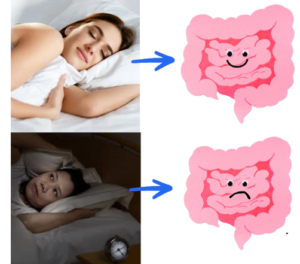The Crucial Relationship Between Quality Sleep and Digestive Health
Sleep serves far more than just a period of rest; it is an essential process that profoundly impacts our digestion and overall well-being. Although the connection may not be immediately visible, the intricate relationship between sleep and digestive health encompasses a multitude of physiological functions working together in harmony. The body’s circadian rhythm, often referred to as the internal body clock, aligns both sleep cycles and digestive functions. This coordination explains why individuals typically feel hungry at similar times each day, demonstrating how our bodies are finely tuned to natural biological rhythms, which influence appetite and metabolic processes.
Understanding the Importance of Restful Sleep for Digestive Processes 
Sleep is crucial for the body’s ability to heal, rejuvenate, and restore various functions. The deeper stages of sleep are particularly vital for these restorative processes. During these profound phases, the organs, tissues, and cells comprising the digestive system not only undergo relaxation but also engage in essential repair mechanisms. The body prioritises cellular repair and growth during deep sleep, especially regarding the regeneration of cells lining the digestive tract, which endure constant wear and tear due to interaction with food particles and digestive enzymes. This cellular regeneration is fundamental for maintaining the integrity of the gastrointestinal lining, thus enhancing the overall efficacy of digestion and nutrient absorption.
Deep sleep plays a significant role in strengthening the immune system, which is especially critical for the digestive system, as it houses specialised immune cells activated by the beneficial bacteria present in the gut. These immune cells are essential for defending the gut and the entire digestive system against harmful microorganisms, thereby ensuring a balanced microbial population within the gut environment, which is vital for optimal digestive health.
Moreover, the organs within the digestive system play a pivotal role in detoxification, facilitating the removal of waste and harmful substances from the body. Deep sleep enhances this detoxification process by optimising the operational efficiency of the liver and kidneys, enabling these organs to perform their functions at peak levels. This synergistic interaction between sleep and detoxification significantly contributes to overall digestive health and wellness, making restorative sleep a cornerstone of effective digestive function.
Examining the Relationship Between Gut Motility and Sleep Quality
An essential aspect of digestion involves the effective movement of food and waste through the digestive tract, a process known as gut motility. This process undergoes significant alterations during sleep. Throughout both deep and light sleep, the rate of gut motility noticeably decreases. This reduction is a necessary adaptation, allowing the digestive system to conserve energy, which is redirected towards repairing digestive tissues and enhancing recovery. This energy conservation enables the digestive process to operate more effectively when awake, thereby optimising both nutrient absorption and waste elimination.
The migrating motor complex signifies a cycle of contractions that occurs during fasting periods, including during sleep. This cycle is indispensable for facilitating gut motility, as it effectively sweeps away food particles and residue that may linger in the digestive system. This natural cleansing mechanism of the digestive tract helps minimise the risks of bacterial overgrowth, fostering a healthy gut environment. Importantly, the migrating motor complex is most actively engaged during the night when individuals are fasting and asleep, underscoring the critical role of sleep in protecting the health of the digestive system.
As dawn approaches, gut motility gradually increases, preparing the digestive system for efficient processing and digestion of food. This rise in motility can often initiate the first bowel movement of the day, illustrating the finely tuned relationship between sleep and gut motility. Understanding this connection is crucial for optimising digestive health and enhancing overall well-being.
Investigating Hormonal Effects on Sleep and Digestive Function
Ghrelin, commonly known as the hunger hormone, plays a significant role in stimulating appetite. In contrast, leptin serves to inform the brain that the stomach is full, thereby helping to prevent overeating. Together, these hormones are crucial in regulating appetite; however, their functions can be severely affected by insufficient sleep.
Even a single night of poor sleep can trigger elevated levels of ghrelin, which can lead to increased appetite and often result in cravings for carbohydrates. This phenomenon is frequently described as feeling ‘hangry’. Compounding this challenge, levels of leptin can significantly decrease after a night of inadequate sleep, disrupting the signals that indicate satiety. This creates a difficult scenario where individuals may overeat and make unhealthy food choices while struggling to recognise their body's signals to stop eating. Although occasional poor sleep may not lead to severe consequences, chronic insomnia can result in substantial digestive issues, including gut inflammation, liver disorders, gastroesophageal reflux disease, inflammatory bowel disease, and even colorectal cancer, alongside contributing to weight gain.
Understanding the Impact of Sleep Disruption on Digestive Health
Disruptions to sleep can lead to a variety of digestive issues. Factors such as shift work, notably night shifts, and experiencing jet lag can profoundly interfere with sleep patterns, throwing off the body’s internal clock. Moreover, eating late at night or maintaining irregular meal times can detrimentally affect the quality of sleep. The circadian rhythm that governs sleep is closely linked to natural sunlight, which is essential for preserving a healthy sleep-wake cycle.
Unfortunately, in today’s technology-driven world, many individuals find themselves spending the majority of their daytime indoors, leading to reduced exposure to natural light. This change has resulted in increased exposure to blue light emitted by devices such as laptops, televisions, and smartphones, further disrupting the sleep cycle and patterns, particularly when this exposure occurs shortly before bedtime.
The cumulative effects of these factors can lead to serious digestive issues, including diarrhoea, ulcers, inflammatory bowel disease, or disruptions in the delicate balance between beneficial and pathogenic bacteria in the gut. This imbalance can also damage the gut lining, complicating the situation regarding digestive health and overall wellness.
Enhancing Microbiome Health Through Quality Sleep Practices
The microbiome encompasses the trillions of microorganisms residing in the gut, predominantly comprising beneficial bacteria known as probiotics, along with viruses, fungi, and potentially harmful bacteria. These microbes are integral not only for overall health but also for digestive health. They bolster the immune response and aid digestion, facilitating the production of certain vitamins, enzymes, hormones, and amino acids. Recent studies have underscored a significant link between the microbiome and sleep, indicating that disrupted sleep or chronic insomnia can adversely affect the balance of these microbes, ultimately influencing digestive health and overall well-being.
Unpacking the Complex Interactions Between Microbiome Health and Sleep Quality
The interplay between sleep and microbiome health is intricate and multifaceted. Poor sleep can detrimentally affect microbiome health, while an imbalanced microbiome can also negatively influence sleep quality. To grasp this complex relationship, one study highlighted a correlation between a higher abundance of specific bacterial types in the gut and quicker sleep onset, alongside fewer awakenings during the night. Although this article cannot explore all the findings in detail, the crucial takeaway is that nurturing a diverse and abundant population of beneficial bacteria in the gut is essential for achieving optimal sleep, effective digestion, and maintaining overall health.
Investigating the Interplay of Stress, Sleep, and Digestive Well-Being
A prevalent outcome of stress and anxiety is disrupted sleep. In turn, these mental health challenges can also adversely affect the physical health and functionality of the digestive system. Such disruption can lead to altered gut motility and contribute to issues like indigestion, ulcers, and irritable bowel syndrome. A key element in this dynamic is the effect of the so-called stress hormone, cortisol.
The Role of Cortisol in Shaping Digestive Processes
When cortisol levels increase, the body’s response involves entering a fight-or-flight state. This physiological reaction results in blood flow being redirected to critical areas such as the heart, brain, lungs, and muscles, while diverting it away from the digestive system. This response prepares the individual to confront danger or escape, a reaction that was essential for survival in prehistoric times.
In modern times, however, stressors are often less life-threatening, such as financial concerns, job-related pressures, or inadequate sleep. Although short-term redirection of blood flow may be beneficial in acute situations, chronic stress can adversely impact the digestive system, particularly concerning gut motility. This can manifest as symptoms including constipation, diarrhoea, indigestion, gas, and bloating. Therefore, implementing effective stress management strategies becomes essential for supporting both gut health and achieving quality sleep.
Ensuring adequate sleep is vital for maintaining a healthy digestive system, as the connection between sleep and digestion is inherently intertwined. Prioritising effective sleep hygiene practices is crucial for achieving restorative sleep. This includes minimising exposure to blue light from electronic devices, maintaining a consistent sleep schedule, creating a cool, dark sleep environment, avoiding food intake within two hours before bedtime, and ensuring exposure to natural light during the day, particularly in the morning, which aids in regulating the circadian rhythm.
References
Understanding Digestive Health and Circadian Rhythms
Exploring Sleep Dysfunction and Digestive Conditions
Examining the Link Between the Gut Microbiome and Sleep
Investigating Stress and Its Effects on the Digestive System
The Article: How Sleep Affects Your Digestive System appeared first on https://janestevensnutrition.com
The Article: Sleep’s Impact on Your Digestive System Explained appeared first on https://janestevens.net
The Article Sleep’s Impact on Digestive Health Explained Was Found On https://limitsofstrategy.com

